UUFBR CUUPs (Covenant of Unitarian Universalist Pagans)
The group goal is to study how the 6th Source and 7th principle of Unitarian Universalism can find richer expression at our Fellowship: Spiritual teachings of earth-centered traditions which celebrate the sacred circle of life and instruct us to live in harmony with the rhythms of nature.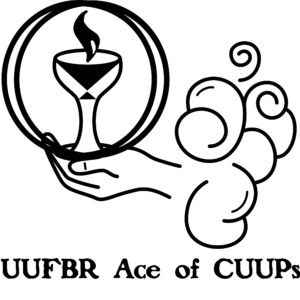
Overview of BR Ace of CUUPs Pagan Study Group
Since the merging of the Unitarians and Universalists in the sixties, as a result of the welcome and the free and responsible search for truth and meaning there has emerged a Unitarian Universalist Paganism, and a Pagan Unitarian Universalism. We are in this together, to help each other!
Covenant of Unitarian Universalist Pagans, or CUUPS is the North American Continental organization that serves to network Pagan UUs, educate, promote dialogue and foster healing
Our Pagan Study Group aspires to become an official chapter of CUUPS and continues working toward that end
Here are the drafts of our foundational documents:
The mission of Boca Raton Ace of CUUPS is to welcome all Earth Centered practitioners and all Unitarian Universalist centered practitioners to explore the teachings and traditions of various pagan and Earth-centered religions, philosophies, and practices together with kindness and respect.
As the CUUPS chapter of UUFBR, we, Boca Raton Ace of CUUPS, covenant to:
- provide support to people in Boca Raton seeking to live a life more in balance with nature by nurturing a free and responsible space to explore the teachings and traditions of various pagan and Earth-centered practices and religions together with dignity, empathy, and safety
- we will honor others’ paths and welcome differences, treasuring diversity
- offer our talents and abilities in service to our fellow congregants at UUFBR and the greater South Florida community by providing celebrations to honor the Earth and its cycles. We seek both mirth and reverence, and we honor the Divine in many forms.
In keeping with those aspirations, here is a summary of our UUFBR Pagan Study Group’s planned contributions to this coming liturgical year 2024-2025
We still meet on the first and third Monday of each month at 7pm. ON HIATUS
First Mondays are on Zoom and Third Mondays are in-person here at the Fellowship — in the Parker Room, or outdoors on the Labyrinth for drum circle. We chose both ways of meeting to accommodate diverse needs.
At our zoom meetings we explore via readings and videos diverse topics from tarot card reading to The Wild Hunt, from Hellenism to lunar phase correspondence, and discuss. We choose the topics and the contents ourselves before and at each meeting and discuss together how we want to proceed. In person we get to explore more hands on subjects like…
Mon, Sept 16th’s: sacred baking: where Adele Alexandre will teach us to bake cornucopia in our kitchen here
Sunday Sept 22: we celebrate the Autumnal Equinox and Mabon, with a morning worship service called “Letting Fall” and a clean up of litter of these grounds and the adjacent University Woodlands park to follow
At our Mon, Oct 21 meeting at 7pm in Parker join us for a witches’ tea party: where we will practice tasseomancy in style
On Sun, Oct 27 we’ll provide a Samhain service honoring the ancestors, followed by a trunk or treat in the parking lot and spooky storytelling in the labyrinth
With the coming of cooler weather, we will resume drum circles and labyrinth meditation walks once a month on the Monday night closest to the full moon.
We plan to be a part of the Fellowship’s beautiful celebration of the Winter Solstice on Saturday evening Dec 21: a celebration of stories, songs and stillness.
We will hold gatherings to celebrate Imbolc and Ostara, though no Sunday morning services are planned yet for those, providing safe, welcoming place for those who want to worship together for those sabbats
We plan to be involved in Earth Day in April 2025 a possible spring cleanup, and…
Of course we will still hold the traditional Sunday morning worship service on May 4th with the May Pole and dancing and strawberries and cream and mimosa brunch after to celebrate in joy together
There will be a Summer Solstice worship service outside on the Labyrinth on June 21st at 8pm
Our Pagan Study Group is proud to contribute to the “Tapestry of Faiths” at UUFBR and strives to be of service
If there is a way that the Pagan Study Group can help you, or if you have questions, please let us know by emailing
MONTHLY: Upcoming Workshops
Moonlight Maze Walk and Drumming
“”Drumming is the simplest thing that we can do to bring us together,” said Babatunde Olatunji. You are warmly invited to join us in energy of a rhythmic beat and meditative motion at the UUFBR labyrinth at sunset and under the light of moon (weather permitting). We will have a brief opening ritual, where the Pagan Study Group will call the quarters. Then, have fun! The drums and the drummers vary in size, type and sound, yet their music merges into one magical combination of unity
Please BYOB (bring your own picnic blanket or beach chair). Feel free to bring hand drums and other percussion instruments of choice.
There is no ceremony to walking the labyrinth. People dance and twirl on the labyrinth path, clap hands, sing and chant. Simply center yourself as you journey to the center of the labyrinth. Start moving along the path toward the center, one after another with space in between each to allow for time at the fire pit. You pace yourself on the path in safe, open space for personal exploration.
Moonlight Maze Walks and Drumming at UUFBR are free (donations are gratefully accepted. Donations of $5 are recognized with a gift of UUFBR’s meditation CD Breathe Again).
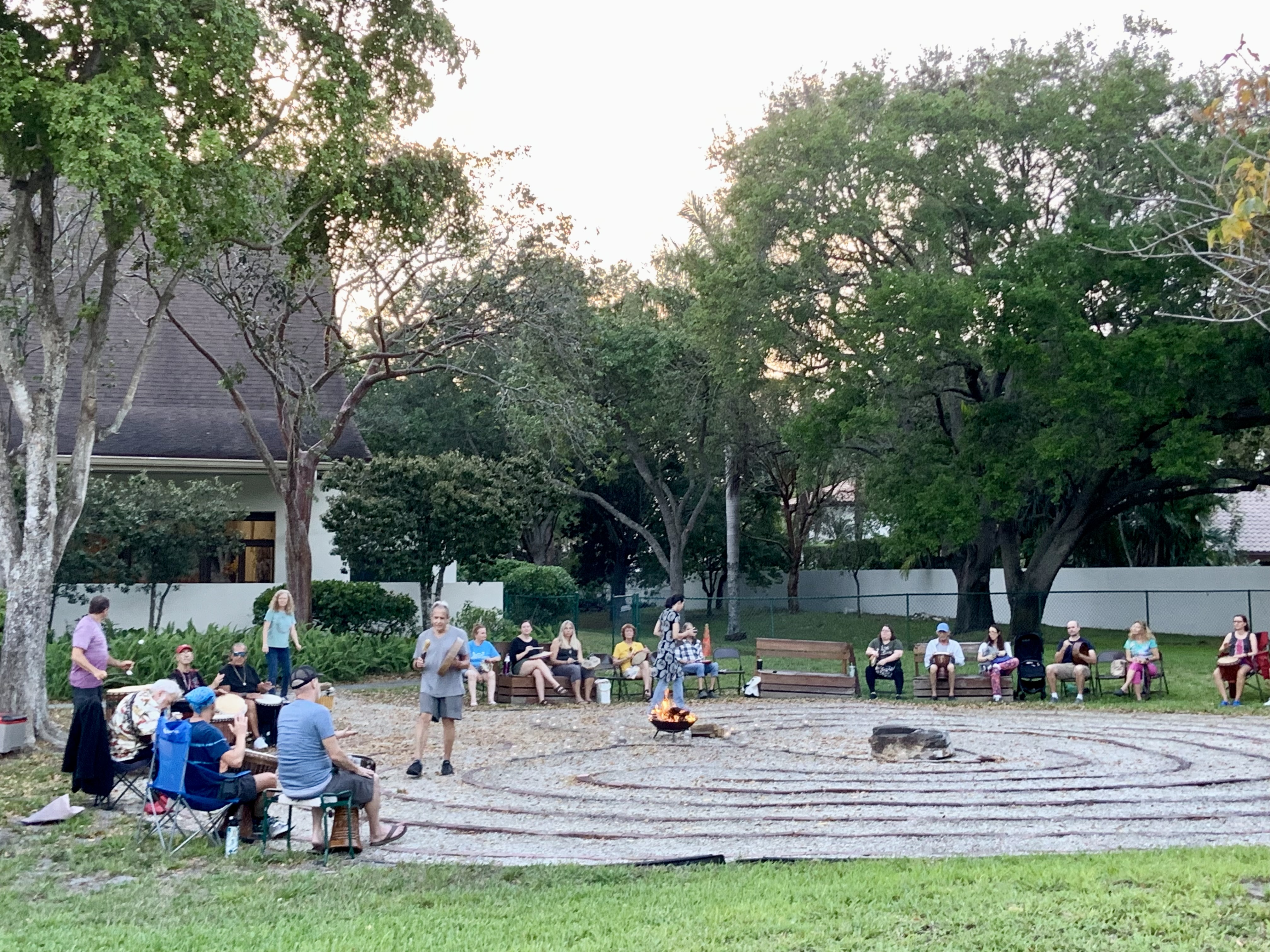
Past Workshops
PAST WORKSHOPS 2024
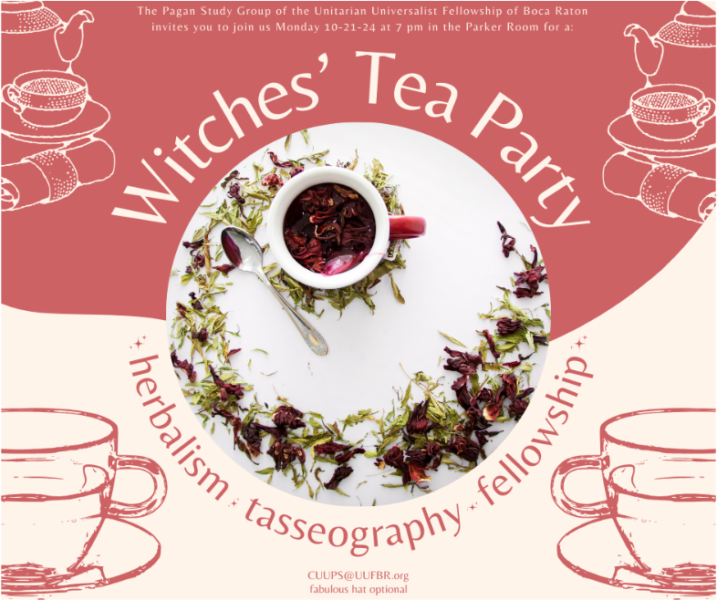
Sept 16th: Sacred Baking: Adele Alexandre will teach us to bake cornucopia in our kitchen here
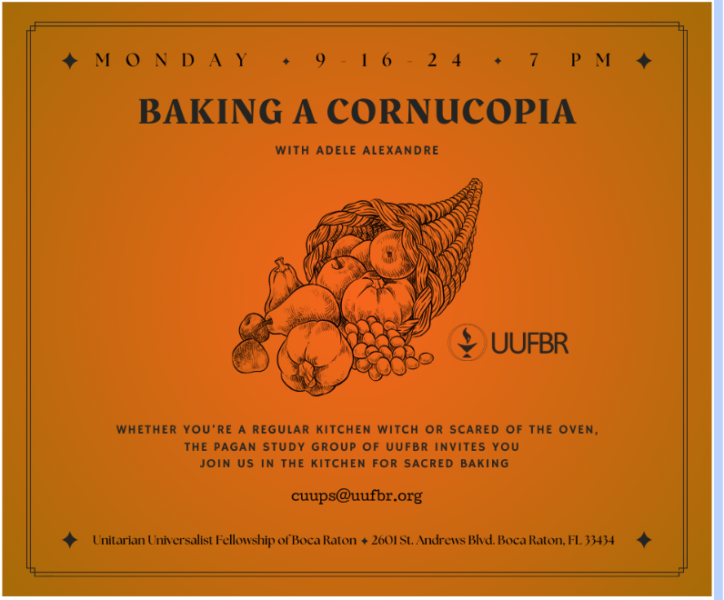
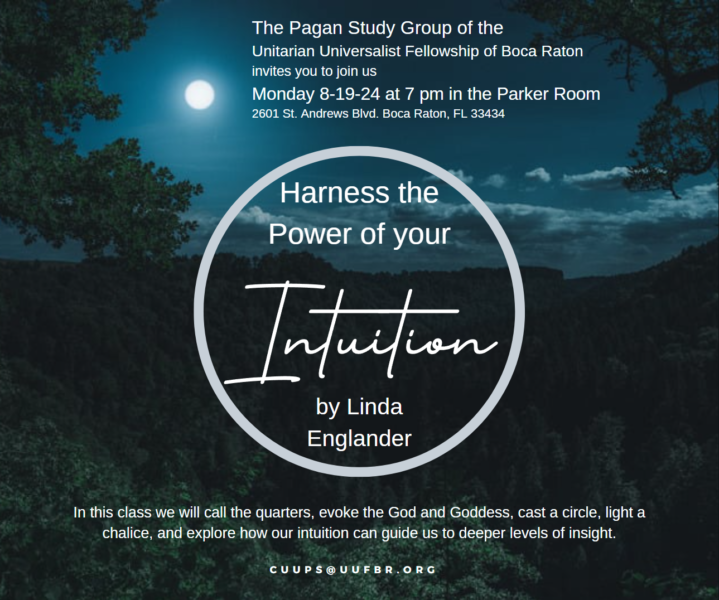
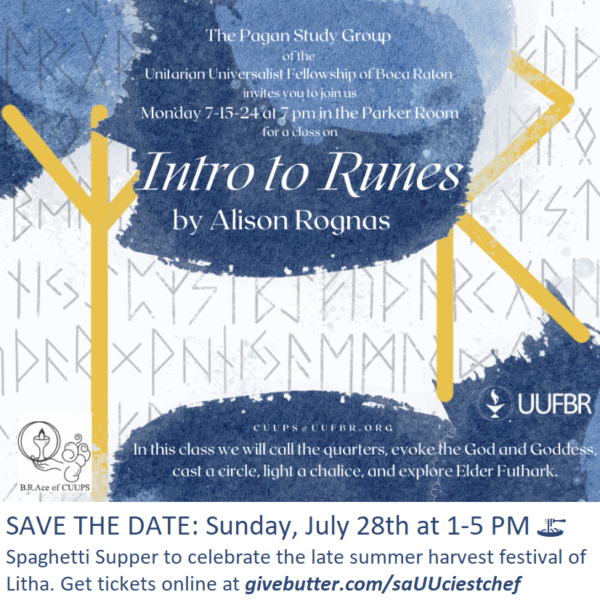
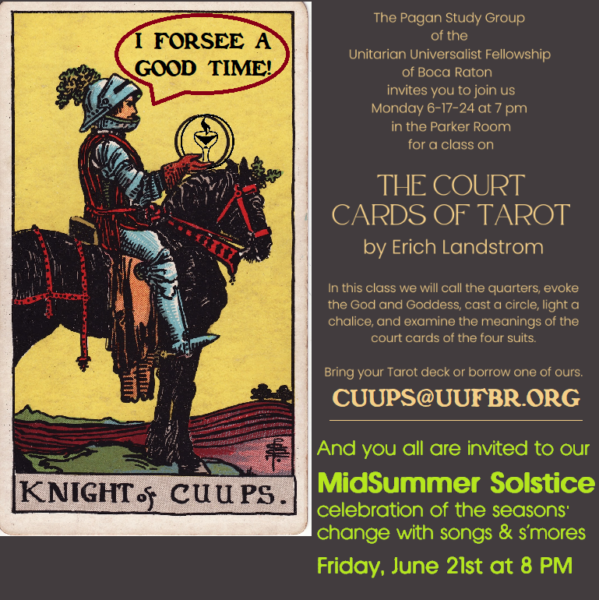
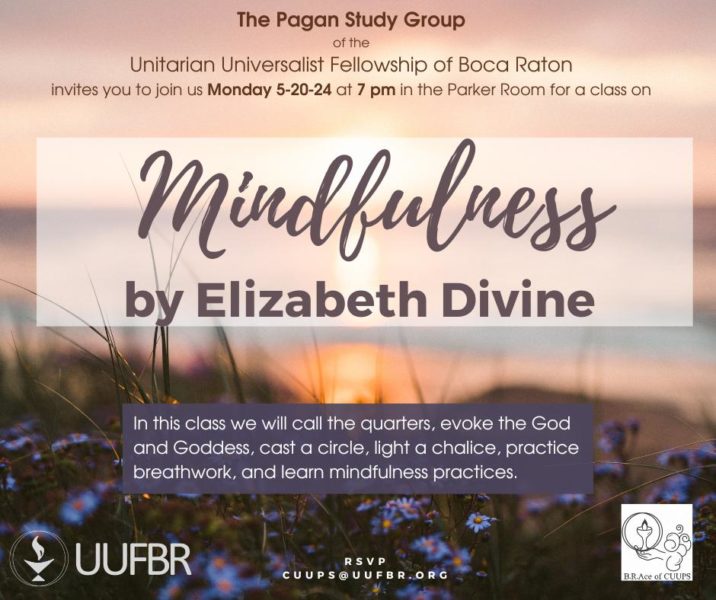
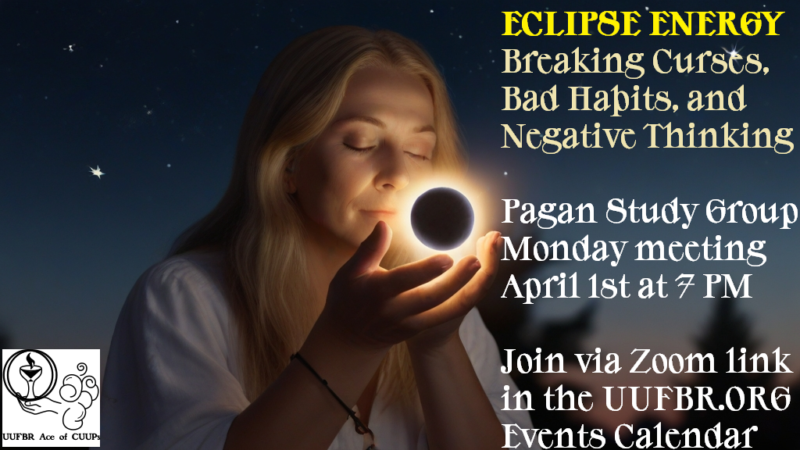
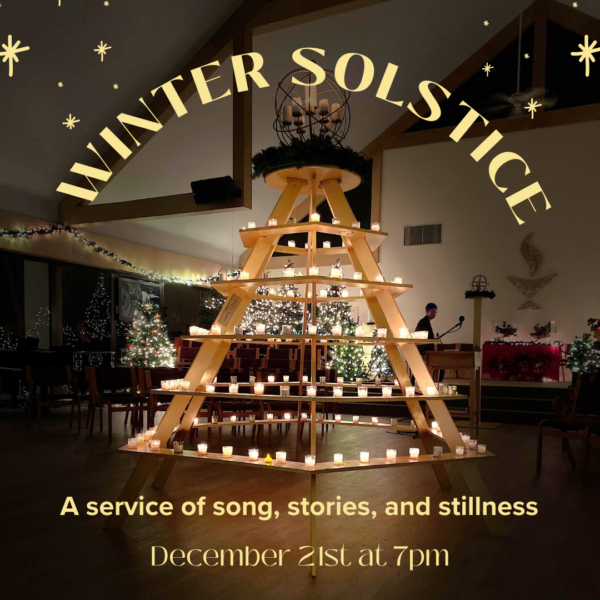
MONTHLY OUUTINGS
FOSTERING THE UU FELLOWSHIP WITH OUUTINGS
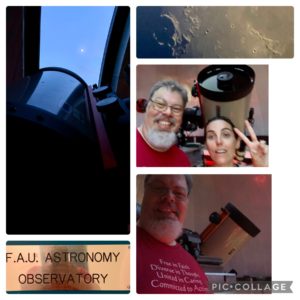
July 2024 SUUMMER OUUTING to FAU Astronomy Observatory. We saw meteorites, models, and the Moon through the telescope.
MARCH: Ostara - Spring Equinox
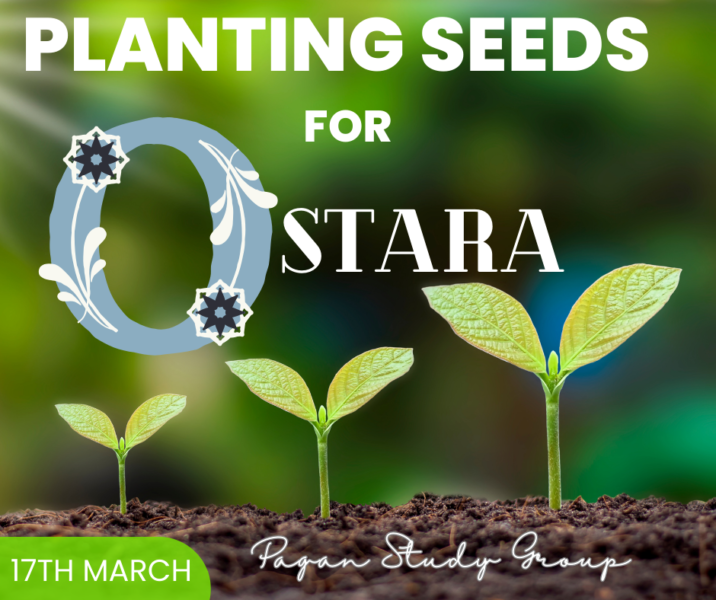
“Ostara: Celebrating the Spring Equinox”
with the Pagan Study Group
Alison Rognas leads this service on Sunday, March 17, 2024
Let the spirit of rebirth and renewal wash over you this Sunday as we gather to honor Ostara, the Spring Equinox. 🌷🌱
The UUFBR Pagan Study Group will guide us in an earthy celebration of the return of light and life through ancient rituals.
You will experience the spiritual power of attuning to nature’s cycles and participate in a sacred seed planting ceremony.
APRIL: Earth Day - Great American Cleanup
It was a perfect spring day, made even better by the hard work of over two dozen volunteers who helped with the Great American Cleanup at University Woodlands Park! On Sunday, April 21, 2024 generations united for an early Earth Day. Inside, they crafted upcycled tote tie-dyed tote bags, and used toilet paper rolls to teach about the World Serpent from Norse legends. Outside, they collected over sixty pounds of trash and loose litter for proper disposal.
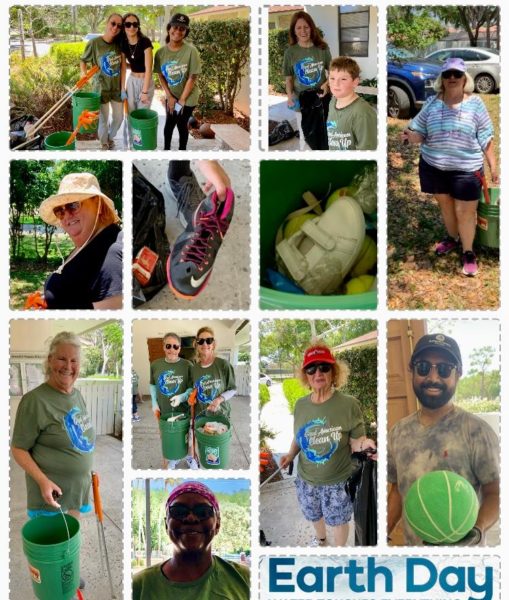
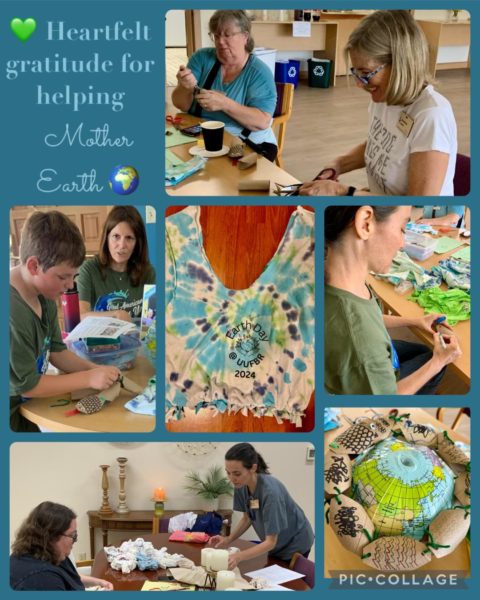
MAY: Beltane - May Day - Walpurgisnacht/Hexennacht - Valborg
Beltane: Celebrating May Day on Sunday, May 5, 2024
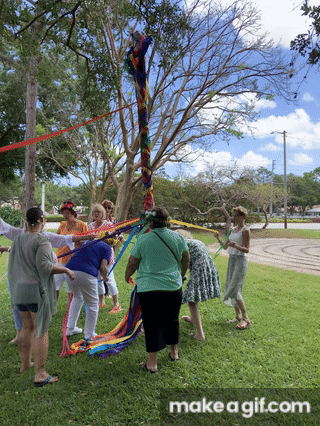
Maypole Dance 2024
The maypole dance is a ceremonial folk dance performed as a part of May Day festivities. Around a tall pole garlanded with greenery or flowers, and hung with long ribbons woven into complex patterns by the dancers, such dances are survivals of ancient dances around a living tree as part of spring rites to ensure fertility.
The Unitarian Universalist Fellowship of Boca Raton (and the South Florida Bryn Mawr Club) invites you and your family to join us on the Sunday service closest to the first of May (AKA Beltane) and continue the tradition. The dance spans centuries and continents, with costumes and controversies.
What you need to know:
- We welcome you to attend our 10:30 AM UU worship service, or arrive at 11:30 AM for our coffee service.
- Potluck brunch with strawberries, cream, and champagne starts around 11:45 AM.
- Traditional dance around the Maypole around 12:15 PM.
- Music: Traditional English air To the Maypole accompanied by percussion – bring your own percussion or use our drums and bells.
- Dress: Traditional white or floral dress. Garlands and floral boutonnieres suggested.
May Day also goes by the name of Beltane. Beltane is a Pagan holiday, and one of the eight Sabbats. It falls about halfway between the spring equinox (Ostara) and the coming summer solstice (Litha). The holiday celebrates spring at its peak, and the coming summer. This festival is commemorated with bonfires, maypoles and dancing. Ceremonies honor the May Queen and the Green Man, and rituals are performed to protect crops and cattle, produce and people, to encourage growth and fertility.
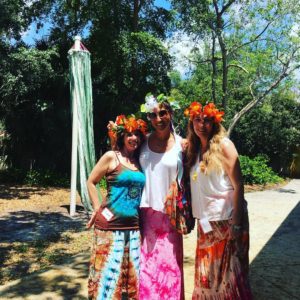
Mira Shoshanah getting ready for Maypole festivities in 2016.
JUNE: Litha - Summer Solstice
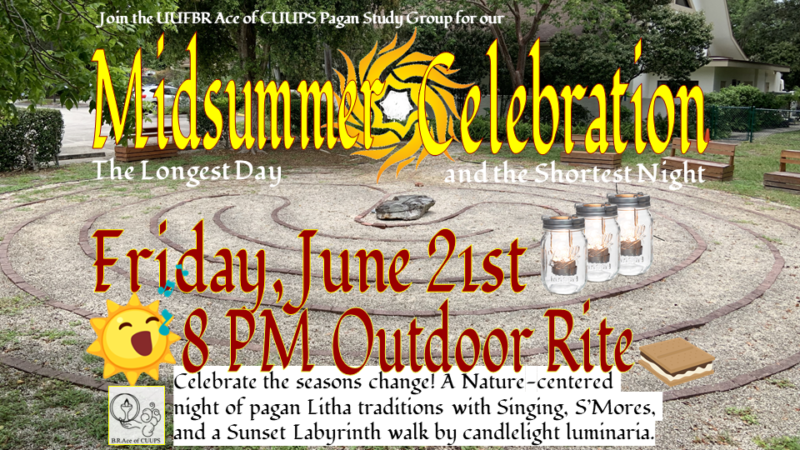 Midsummer Celebration (Friday, June 21, 2024 — 8 PM Outdoor Rite)
Midsummer Celebration (Friday, June 21, 2024 — 8 PM Outdoor Rite)
Celebrate the seasons change! A Nature-centered night of pagan Litha traditions with Singing, S’Mores and a Sunset Labyrinth Walk lit by candlelight luminaria.
.
.
.
.
.
.

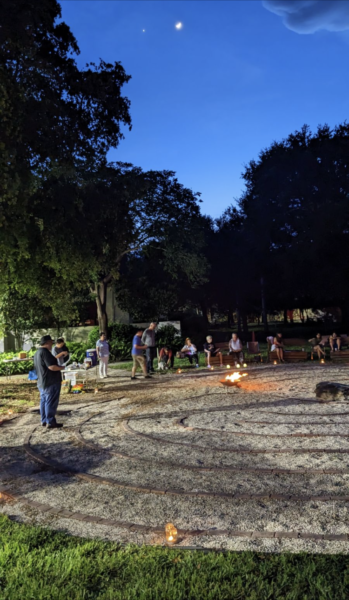
AUGUST: Lammas - Lughnasagh - First Fruits
Traditionally, First Fruits is a religious offering of the first agricultural produce of the summer harvest. But it’s more than a time to show appreciation for the abundance of nature and the nurturing spirit of the land. It’s a festival to acknowledge intentions, and to ask a blessing on our efforts as we do the best we can. Join us to express gratitude, and to embrace the change of the cyclical nature of life.
Traditionally Lammas is held on 1 August, or about halfway between the summer solstice and autumn equinox, although in recent centuries some celebrations have shifted to the Sunday nearest this date. Lammas is a festival in the ritual calendar to mark the blessing of the First Fruits of harvest. In the religions of the ancient western world of Europe and the Levant, the first fruits were sacred, a spiritual sacrifice, and to be given to priests as an offering to the Holy.
For the classical ancient Greeks, first fruits took the form of aparche (ἀπαρχή) given to the high priestess of Demeter and Phersephone, the mother and daughter goddesses of grains and vegetation. Still to this day, three thousand years, we retell the myth and sacred mystery of the abduction of Persephone from her mother Demeter by the king of the underworld Hadestown. The cycle has three phases: the descent, the long winter of Demeter’s search when crops failed and famine spread, and the ascent of Persephone and reunion with her mother. Persephone’s rebirth is symbolic of the rebirth of all plant life and the symbol of eternity of life that flows from the generations that spring from each other. And the first fruits closes the cycle with the harvest in honor of the two goddesses with ancestral custom.
In ancient Judaism, bikkurim were a type of sacrificial offering. With the ripening of summer grains, the first-grown fruits of labor were brought to the Temple and laid by the altar, and a special declaration recited. The command to bring first fruits to the Temple appears in the Torah, in Deuteronomy 26:1–11 and Exodus 23, starting at verse 16:
16 “Celebrate Shavuot, the Festival of Harvest, with the first fruits of the crops you sow in your field. “Celebrate Sukkot, the Festival of Ingathering, at the end of the year, when you gather in your crops from the field. 17 “Three times a year all the men are to appear before the Sovereign Lord. 19 “Bring the best of the first fruits of your soil to the house of the Lord your God.
The bikkurim is the sacrificial offering of the Shavuot holiday: the first fruits of the wheat harvest in Israel. In addition, rabbinic tradition teaches that the date Shavuot was regarded as an appropriate time to make and renew the covenants between heaven and humanity. The association between Shavuot and oaths suggests a connection to the giving of the Torah, which itself was a covenant between the God of Abraham and Israel. According to the Book of Jubilees, it was on Shavuot after the flood that Elohim made a covenant with Noah and all his descendants and with every living creature with them – birds, livestock, and all wildlife of the earth that came out of the ark. According to the tradition of Orthodox Judaism, Shavout also marks the revelation of the Ten Commandments to Moses and the Israelites.
Moving from the Mediterranean Sea to the North Sea, from Mount Sinai to the moors of Scotland and Ireland. The pagan Celts there celebrated Lughnasadh. The Book of Invasions says Lughnasadh was established as a harvest festival and funeral games in the last weeks of July by the great hero Lugh of the Long Hand, in memory of his foster-mother Tailtiu. The Tailtean Games were similar to the modern Olympics, with contests including sword fighting, archery, wrestling, boxing, swimming, the long jump, the high jump, running, spear throwing, and horse racing. The Tailtean Games culminated in the celebration of Lughnasadh, and this is why:
Lugh led the Tuatha Dé Danann, the folk of the goddess Danu, in battle against their former king Bres and the monstrous Fomorians. Prior to the battle, Lugh asked each man and woman in his army what art he or she would bring to the fray; he then addressed his army in speech, which elevated each warrior’s spirit to that of a king or lord.
After the victory Lugh found Bres, alone and unprotected on the battlefield, and Bres begged for his life. Lugh spared him because the king promised to teach the Tuatha Dé Danann how and when to plough, sow, and reap. Lugh lost his mother Tailtiu after the battle, when she died of exhaustion after clearing the plains of Ireland for agriculture.
In Anglo-Saxon England, Lammas was the name for the first day of August. The Anglo-Saxon Chronicle describes “the feast of first fruits”. Lammas, or loaf-mass, was the day when loaves baked from the first of the wheat harvest were blessed at a Christian church during a loaf-mass. The loaves might then have been used in protective rituals: a book of Anglo-Saxon charms directed that a Lammas loaf be broken into four parts, to be placed at the four corners of a barn in order to protect the grain.
And so we come to the question my fellow UU pagan Julie Ryan asked of how to celebrate first fruits today in the modern age since many of us in the congregation don’t grow our own food. Lughnasadh is about celebrating the hard work of the harvest, and presenting it with pride to a higher power. I credit her suggestion that we keep the theme going by celebrating and thanking ourselves for the hard work we put into our lives every day. We are Unitarian Universalists, and service is our prayer!
First fruits are not about abundance or scarcity. They are about making a voluntary sacrifice to make the world—and the Goddess—fertile again. And as Maria Montessori said about a fertile imagination: “the secret of good teaching is to regard the child’s intelligence as a fertile field in which seeds may be sown, to grow under the heat of flaming imagination.”
You are the fertile field into which the winds carry and co-mingle the pollen of someone else’s words and actions. And in turn you are also a corn farmer and a good teacher of our Unitarian Universalist Fellowship’s covenant: to dwell together in peace, to seek the truth in love, to the end that all shall grow into harmony. And today, at the fire festival of Lughnasadh, you are also the heat of a flaming imagination. “Imagination does not become great until human beings, given the courage and the strength, use it to create,” to quote Maria Montessori again.
Lugh of the Long Hand knew this. In addition to the athletic sports of the Tailteann Games, he also included challenges in singing, dancing, strategy and story-telling, along with crafts competitions for goldsmiths, jewelers, weavers and armorers. Lugh was Chief Ollam of Ireland because he was a warrior-poet: a champion AND a master craftsman, a hero and an historian and a harp-player.
In our fellowship, we have gratitude for the diverse roles we fulfill in our everyday lives. Beyond our professional identities, we recognize and honor the multifaceted roles that define us — whether as parents, partners, or problem-solvers. Each of these roles is a testament to our commitment to service, where our daily actions become a form of prayer, enriching both our own lives and the lives of those around us. Just as we cherish and celebrate the contributions of every individual, we understand that our occupations do not solely define us but rather complement the myriad ways we contribute to our communities and the world at large.
You may feel when you make an offering of first-fruits in whatever role to whatever you hold nearest and dearest to your soul, it needs to be a perfect offering. This is a mistake. It is a bad application of the economic principle of comparative advantage. It is an even worse flaw in worrying about what’s not good enough. Don’t let the perfect be the enemy of the good. Forget your perfect offering. Read that again: forget your perfect offering.
Forget your perfect offering
Ring the bells that you can ring
There is a crack in everything
That’s how the light gets in!SEPTEMBER: Mabon - Autumn Equinox
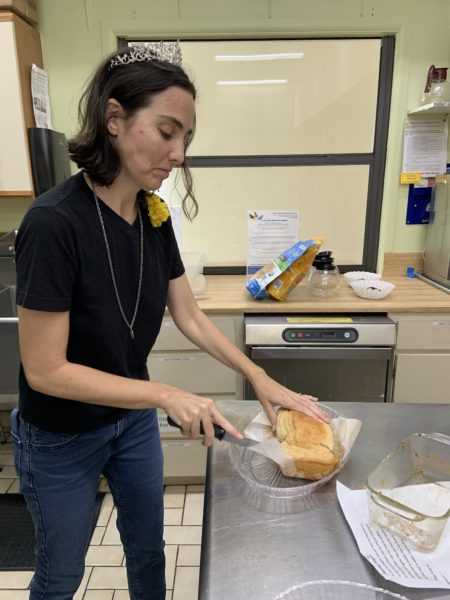
Alison leads the Pagan Study Group in making quick bread for Mabon in the UUFBR kitchen
The autumnal equinox around September 20th is known variously among neopagans as Mabon, Harvest Home, and the Feast of the Ingathering. It is the second of the neopagan harvest festivals (after the first harvest Lammas). We offer thanksgiving for the fruits of the earth and recognize the need to share them to secure the blessings of the Goddess and the God during the coming winter months. In addition to fruits and vegetables, bread represents the sustenance of life, and grains such as wheat and barley symbolize the fertility of the earth.
Baking bread and breaking bread together signifies more than just sharing food. It can also be an act of love and reconciliation. It pays homage to a bountiful harvest season and also brings together the flavors of the equinox in a way that’s deeply connected to our pagan practice.
SEPTEMBER: International Coastal Cleanup in University Woodlands Park
International Coastal Cleanup 2024
 UUFBR participated in the International Coastal Cleanup on Sunday, September 22, 2024 at 12 noon in University Woodlands Park, 2501 St. Andrews Blvd. (off Glades Rd.) and the area surrounding the fellowship grounds to pick up litter and loose trash.
UUFBR participated in the International Coastal Cleanup on Sunday, September 22, 2024 at 12 noon in University Woodlands Park, 2501 St. Andrews Blvd. (off Glades Rd.) and the area surrounding the fellowship grounds to pick up litter and loose trash.
Volunteers joined us for the 2024 International Coastal Cleanup on Sunday, September 22nd as we collected 22 kilograms (48.5 lbs) of trash from the park, playground, picnic areas, and parking lots at University Woodland Park.
🛐 Enjoy the service, then enjoy Nature as we put the UU 7th Principle into practice: Respect for the interdependent web of all existence of which we are a part. We believe in caring for our planet Earth, the home we share with all living things. Our Pagan Study Group hosts cleanups of University Woodlands Park and playground, and parking lot of UUFBR.
The worst offenders we pick up are as follows:
- Cigarette butts
- Food wrappers
- Beverage bottles and caps
- Plastic bags
- Plates (paper, plastic, and foam)
🗑️ Together, we can #KeepBocaBeautiful and #RestoreMidgard.
International Coastal Cleanup 2023
As the rainfall reminded us, litter from inland areas washes downstream. So if we can, let’s prevent University Woodlands park and playground from possibly polluting the ocean with marine debris. Thank you volunteers for tackling neighborhood garbage and help making a trash-free seashore!

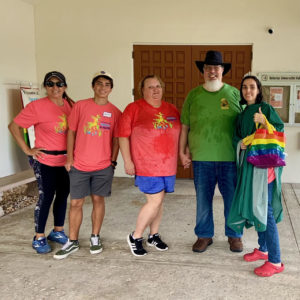
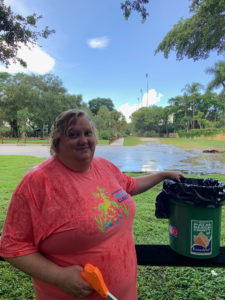
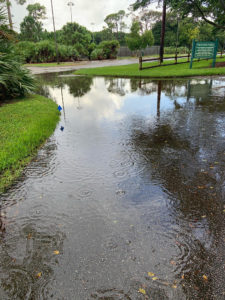
OCTOBER: Samhain - Halloween
💀 The Pagan Study Group leads the Samhain service Sunday, October 27th at the UU Fellowship of Boca Raton. To honor our ancestors who have passed on, as well as the spirits of this land, participants are invited to bring a photo or memento of a loved one who has passed on, human or animal. This time provided an opportunity to focus on the Sixth Source of Unitarian Universalism.
🧙♀️🎃🧙 October 31st is a cross-quarter day, about halfway between the autumnal equinox and winter solstice. Samhain, one of the eight Wiccan sabbats observed during the year, is usually celebrated from October 31st to November 1st. Samhain is a pagan festival that originated from Celtic spiritual traditions, marking the end of the harvest season and the beginning of winter, which the Celts associated with death (the Gaelic word “Samhain” translates to “summer’s end”). The Celts believed that on this day, the boundaries between the living and the dead are thought to be especially thin. Samhain is part of the origin of modern Halloween.
DECEMBER: Yule - Winter Solstice
Winter Solstice Celebration
December 21st
6 PM: Lit Labyrinth Meditation Walks available
7 PM: Solstice Service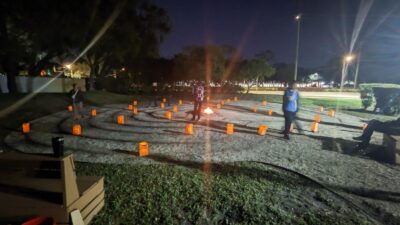
🎄⛄️ Join us for a magical, musical night as we honor the winter solstice together. Let the solstice songs transport you, the stories enchant you, and the stillness center you to celebrate the Yuletide season. Come one, come all and celebrate the longest night of the year with communal joy, meaning, and wonder. As melodies fill the sanctuary, candles flicker – kindling connections new yet familiar. We gather to raise our voices and honor the return of light. ❄️🕯️
GROW YOUR INTUITIVE GIFTS WORKSHOP
GROW YOUR INTUITIVE GIFTS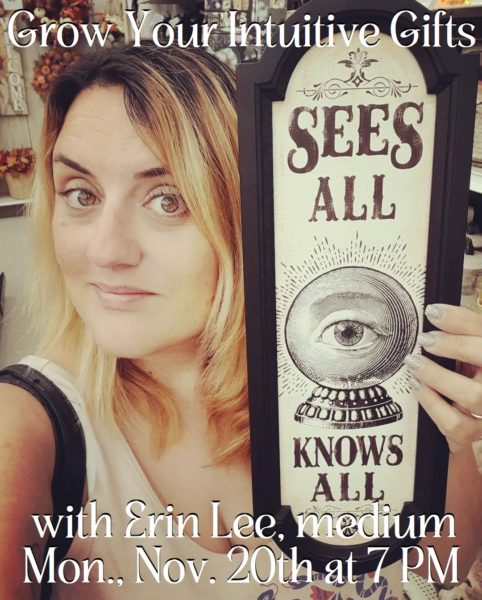
UUFBR Pagan Study Group thanks Erin Lee, medium and author of “Psychic Development: An Intermediate Guide”. Erin taught an introductory class on how to “Grow Your Intuitive Gifts” in November 2023.
We had a great turnout for those who are seek knowledge as they continue to develop and grow in their abilities. Watch a rebroadcast of the workshop from the UUFBR Instagram livestream, and discover more about your psychic and intuitive talents.
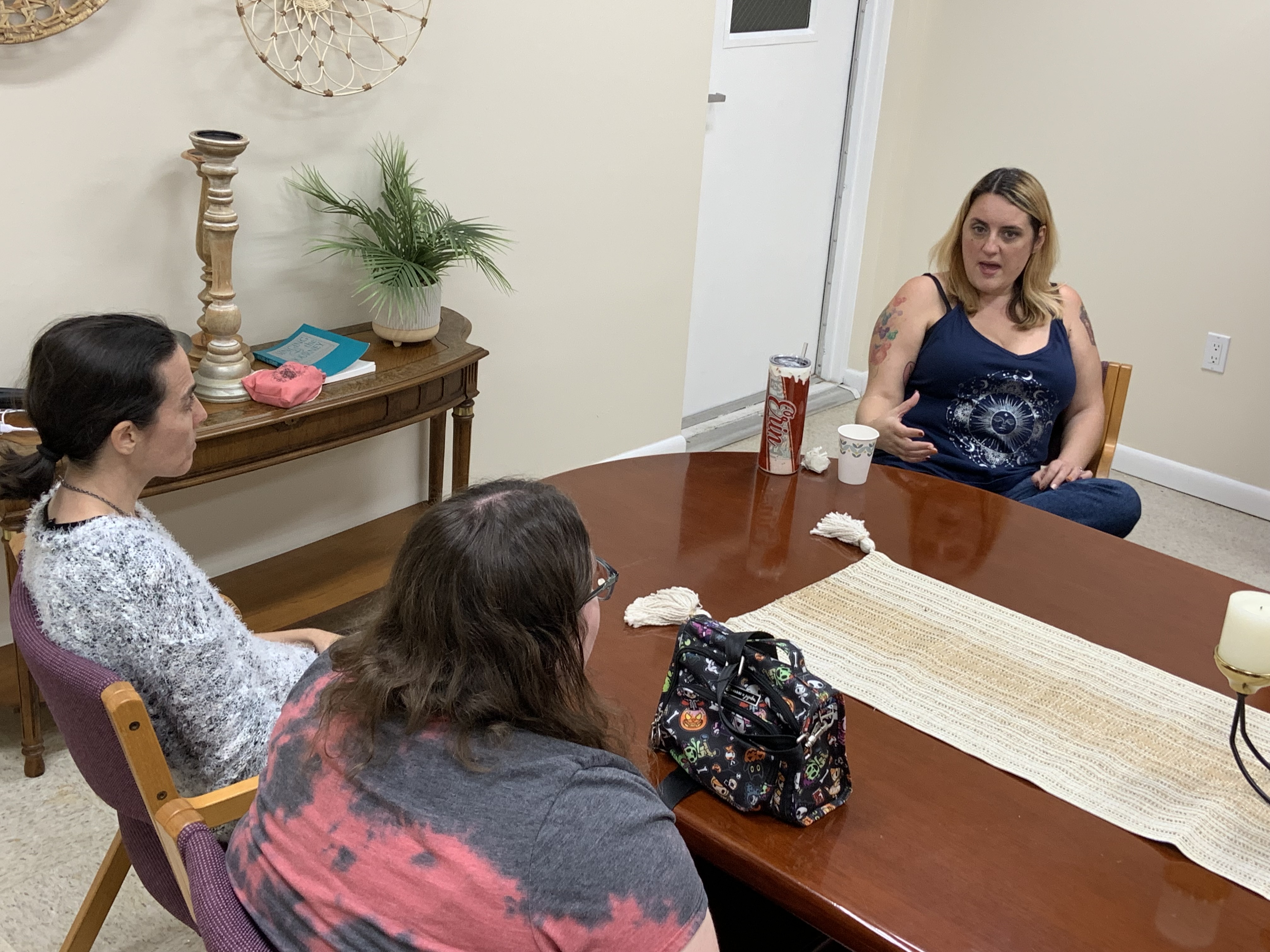 Erin Lee, medium, talks with the UUFBR Pagan Study Group
Erin Lee, medium, talks with the UUFBR Pagan Study Group

